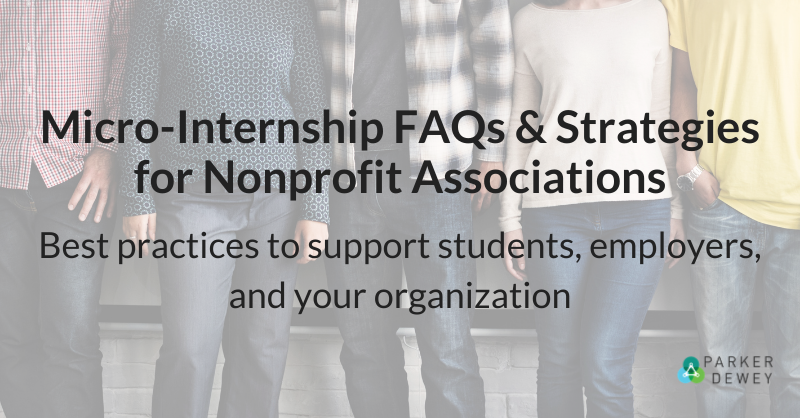.png)
Achieving DEI Goals
In this series, we’re covering six of the most pressing challenges facing campus recruiters right now. Stay tuned as we release a new post each week! Access the full eBook here.
In a post-COVID world, meaningful diversity, equity, and inclusion initiatives have become even more critical. Still, many organizations face internal obstacles when it comes to attracting and retaining diverse talent. This is where Micro-Internships come into play—enabling companies to create sustainable and equitable pathways that reach candidates while overcoming internal hurdles. More than 80% of Micro-Interns hired on Parker Dewey come from underrepresented backgrounds—leading to fresh perspectives, innovative ideas, and a diverse range of experiences, enhancing creativity and problem-solving within the organization.
Read on to learn how Micro-Internships help companies make measurable impacts on their DEI goals.
Engaging nontraditional students
Traditional internships often require a significant time commitment, making them inaccessible for many individuals, especially those from underrepresented backgrounds. Micro-Internships serve as a flexible alternative, allowing candidates to participate remotely, work part-time, and complete projects on a timeline that works with their availability. This flexibility enables students who may have other responsibilities, such as caregiving or part-time jobs, to gain valuable work experience and explore potential career paths. Read one success story from a nontraditional student here.
Broadening the talent pool
While traditional recruiting often favors students from target universities or those with extensive networks, Micro-Internships help companies tap into a wider talent pool. Through the Parker Dewey platform, employers also have access to career launchers affiliated with organizations like Dell Scholars, Bottom Line, The Dream.US, and Winning Edge. For companies specifically focused on reaching students from HBCUs and HSIs, initiatives like the grant-funded Frederick A. DeLuca Micro-Internship Program serve as a valuable opportunity to engage with a diverse pool of talented students.
Removing financial barriers to participation
Many college students and recent graduates aren’t able to take on an unpaid internship—yet female, Black, Latino, and first-generation students remain overrepresented in unpaid internships and underrepresented in paid opportunities. Because Micro-Internships are always paid—and paid fairly—they remain accessible to those who can’t afford to work for low or no pay. One Micro-Intern recently shared that he won’t take the time to investigate unpaid opportunities, noting that he needed to set himself up for success by opting for pay: “There were a few unpaid internships Howard sent me, and I’ll be honest, I did not look at them because it’s not realistic to ask someone to work for free.”
Looking beyond traditional hiring signals
Micro-Interns are not hired based upon GPA, academic pedigree, or personal connections—constraints that often filter out huge pools of candidates. Instead, applicants from all backgrounds can apply to any project with a short-answer application. Throughout the project, hiring managers are encouraged to assess Micro-Interns based on core skills and growth potential. By providing access to meaningful work experiences and mentorship, Micro-Internships empower students to develop skills, build confidence, and expand their professional networks. This creates a more level playing field, enabling companies to identify and nurture talent that might have been overlooked through traditional recruitment processes.
Empowering employee resource groups (ERGs)
Micro-Internships can empower employee resource groups to become strategic recruiting partners for the organization. ERGs are affinity-based employee-led groups that bring together individuals with shared characteristics or experiences, such as ethnicity, gender, or disability, to foster inclusion and advocate for their communities. By leveraging Micro-Internships, ERG members can actively engage with diverse candidates and provide career mentoring support while getting assistance on real work projects.
Tackling internal obstacles
Micro-Internships offer a practical solution to internal obstacles that companies often face when trying to implement DEI initiatives, like budget constraints, limited resources for onboarding and training, and resistance to change from current employees. Micro-Internships allow companies to allocate resources more efficiently, as they involve shorter-term commitments and focus on specific projects. This approach reduces the strain on existing staff while providing valuable opportunities for professional development and mentorship. See one example of how one company was able to reduce cost per hire here.
Micro-Internships promote inclusivity by reducing the barriers that prevent underrepresented groups from participating in traditional internships. Learn more about how Micro-Internships can supplement your existing initiatives here.




